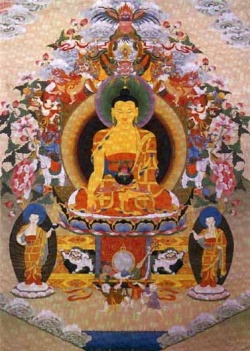Difference between revisions of "Kali"
(Created page with "thumb|250px| <poem> '''Kali''' [迦利王] (Skt; Jpn Kari-o) A violent king who appears in a story about one of Shakyamuni Buddha's previous lives. ...") |
|||
| (3 intermediate revisions by 2 users not shown) | |||
| Line 1: | Line 1: | ||
[[File:Bjtk090a.jpg|thumb|250px|]] | [[File:Bjtk090a.jpg|thumb|250px|]] | ||
<poem> | <poem> | ||
| − | '''Kali''' | + | '''[[Kali]]''' |
| − | [迦利王] (Skt; Jpn Kari-o) | + | [[迦利王]] (Skt; Jpn [[Kari-o]]) |
| − | A violent king who appears in a story about one of Shakyamuni Buddha's previous lives. According to the Sutra on the Wise and the Foolish, in the remote past there lived an ascetic named Forbearance, who was engaged in the practice of forbearance, one of the six paramitas. One day, Kali, king of Varanasiin Jambudvipa, went into the mountains to pass the time with his wife, ministers, and maids-in-waiting. Feeling tired at one point, he lay down and fell asleep. The maids wandered about freely looking at flowers and happened upon the ascetic Forbearance, who was absorbed in meditation. They paid him their respects and listened to the ascetic preach. Awakening from his sleep, King Kali and his ministers searched for the maids and found them sitting before the ascetic. He asked the ascetic about the types of meditation he had attained, but the ascetic said that he had attained none. Angered, Kali said to the ascetic that he was nothing but an ordinary mortal, and that he had suspicions about the ascetic's intentions with the maids. Asked what kind of practice he was engaged in, the ascetic said that he was carrying out the practice of forbearance. The suspicious king then decided to test his forbearance by cutting off his hands, feet, ears, and nose, but the ascetic remained unperturbed. The blood that poured from his wounds changed into milk and his body was restored. Kali deeply repented his actions and to make amends he frequently invited the ascetic to his palace and gave him offerings. According to the sutra, having related this story, Shakyamuni reveals that the ascetic was himself in a past existence, and the king was Ajnata Kaundinya, one of Shakyamuni's first converts. | + | A [[violent]] [[king]] who appears in a story about one of [[Shakyamuni]] [[Buddha]]'s previous [[lives]]. According to the [[Sutra]] on the [[Wise]] and the [[Foolish]], in the remote {{Wiki|past}} there lived an {{Wiki|ascetic}} named [[Forbearance]], who was engaged in the practice of [[forbearance]], one of the [[six paramitas]]. One day, [[Kali]], [[king]] of [[Varanasiin]] [[Jambudvipa]], went into the [[mountains]] to pass the [[time]] with his wife, ministers, and maids-in-waiting. [[Feeling]] tired at one point, he lay down and fell asleep. The maids wandered about freely looking at [[flowers]] and happened upon the {{Wiki|ascetic}} [[Forbearance]], who was absorbed in [[meditation]]. They paid him their respects and listened to the {{Wiki|ascetic}} {{Wiki|preach}}. [[Awakening]] from his [[sleep]], [[King]] [[Kali]] and his ministers searched for the maids and found them sitting before the {{Wiki|ascetic}}. He asked the {{Wiki|ascetic}} about the types of [[meditation]] he had [[attained]], but the {{Wiki|ascetic}} said that he had [[attained]] none. Angered, [[Kali]] said to the {{Wiki|ascetic}} that he was [[nothing]] but an {{Wiki|ordinary}} {{Wiki|mortal}}, and that he had suspicions about the {{Wiki|ascetic}}'s {{Wiki|intentions}} with the maids. Asked what kind of practice he was engaged in, the {{Wiki|ascetic}} said that he was carrying out the practice of [[forbearance]]. The suspicious [[king]] then decided to test his [[forbearance]] by cutting off his hands, feet, {{Wiki|ears}}, and {{Wiki|nose}}, but the [[ascetic]] remained [[unperturbed]]. The {{Wiki|blood}} that poured from his wounds changed into milk and his [[body]] was restored. [[Kali]] deeply repented his [[actions]] and to make amends he frequently invited the {{Wiki|ascetic}} to his palace and gave him [[offerings]]. According to the [[sutra]], having related this story, [[Shakyamuni]] reveals that the {{Wiki|ascetic}} was himself in a {{Wiki|past}} [[existence]], and the [[king]] was [[Ajnata Kaundinya]], one of [[Shakyamuni]]'s first converts. |
</poem> | </poem> | ||
{{R}} | {{R}} | ||
Latest revision as of 21:05, 16 April 2014
Kali
迦利王 (Skt; Jpn Kari-o)
A violent king who appears in a story about one of Shakyamuni Buddha's previous lives. According to the Sutra on the Wise and the Foolish, in the remote past there lived an ascetic named Forbearance, who was engaged in the practice of forbearance, one of the six paramitas. One day, Kali, king of Varanasiin Jambudvipa, went into the mountains to pass the time with his wife, ministers, and maids-in-waiting. Feeling tired at one point, he lay down and fell asleep. The maids wandered about freely looking at flowers and happened upon the ascetic Forbearance, who was absorbed in meditation. They paid him their respects and listened to the ascetic preach. Awakening from his sleep, King Kali and his ministers searched for the maids and found them sitting before the ascetic. He asked the ascetic about the types of meditation he had attained, but the ascetic said that he had attained none. Angered, Kali said to the ascetic that he was nothing but an ordinary mortal, and that he had suspicions about the ascetic's intentions with the maids. Asked what kind of practice he was engaged in, the ascetic said that he was carrying out the practice of forbearance. The suspicious king then decided to test his forbearance by cutting off his hands, feet, ears, and nose, but the ascetic remained unperturbed. The blood that poured from his wounds changed into milk and his body was restored. Kali deeply repented his actions and to make amends he frequently invited the ascetic to his palace and gave him offerings. According to the sutra, having related this story, Shakyamuni reveals that the ascetic was himself in a past existence, and the king was Ajnata Kaundinya, one of Shakyamuni's first converts.
